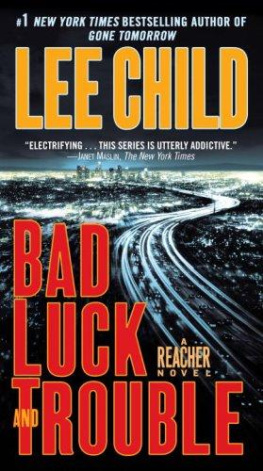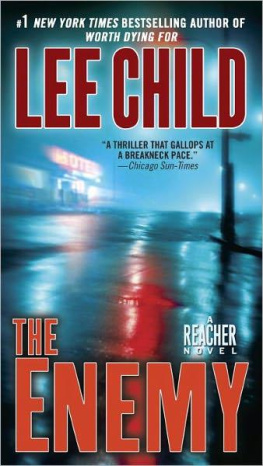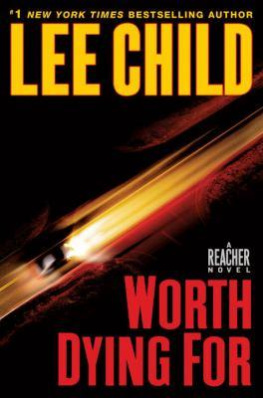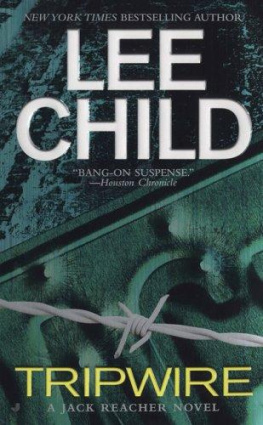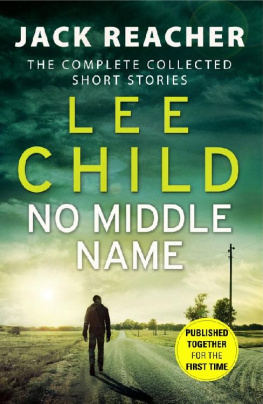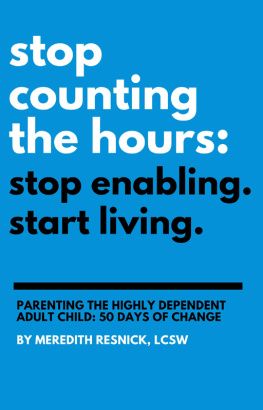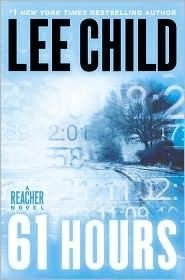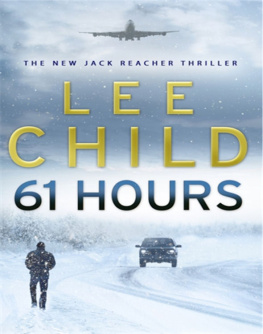Lee Child - 61 Hours
Here you can read online Lee Child - 61 Hours full text of the book (entire story) in english for free. Download pdf and epub, get meaning, cover and reviews about this ebook. year: 2010, publisher: Delacorte Press, genre: Detective and thriller. Description of the work, (preface) as well as reviews are available. Best literature library LitArk.com created for fans of good reading and offers a wide selection of genres:
Romance novel
Science fiction
Adventure
Detective
Science
History
Home and family
Prose
Art
Politics
Computer
Non-fiction
Religion
Business
Children
Humor
Choose a favorite category and find really read worthwhile books. Enjoy immersion in the world of imagination, feel the emotions of the characters or learn something new for yourself, make an fascinating discovery.

- Book:61 Hours
- Author:
- Publisher:Delacorte Press
- Genre:
- Year:2010
- Rating:3 / 5
- Favourites:Add to favourites
- Your mark:
- 60
- 1
- 2
- 3
- 4
- 5
61 Hours: summary, description and annotation
We offer to read an annotation, description, summary or preface (depends on what the author of the book "61 Hours" wrote himself). If you haven't found the necessary information about the book — write in the comments, we will try to find it.
61 Hours — read online for free the complete book (whole text) full work
Below is the text of the book, divided by pages. System saving the place of the last page read, allows you to conveniently read the book "61 Hours" online for free, without having to search again every time where you left off. Put a bookmark, and you can go to the page where you finished reading at any time.
Font size:
Interval:
Bookmark:
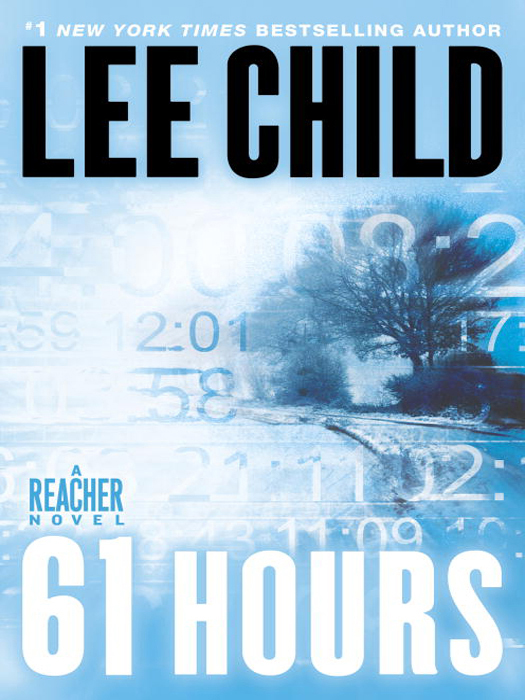
Also by LEE CHILD
Killing Floor
Die Trying
Tripwire
Running Blind
Echo Burning
Without Fail
Persuader
The Enemy
One Shot
The Hard Way
Bad Luck and Trouble
Nothing to Lose
Gone Tomorrow
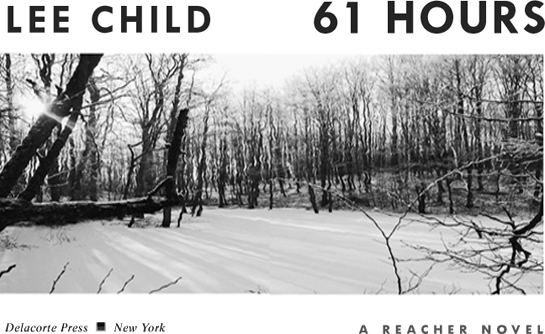
For my editor
the one and only
Kate Miciak
Five minutes to three in the afternoon. Exactly sixty-one hours before it happened. The lawyer drove in and parked in the empty lot. There was an inch of new snow on the ground, so he spent a minute fumbling in the foot well until his overshoes were secure. Then he got out and turned his collar up and walked to the visitors entrance. There was a bitter wind out of the north. It was thick with fat lazy flakes. There was a storm sixty miles away. The radio had been full of it.
The lawyer got in through the door and stamped the snow off his feet. There was no line. It was not a regular visiting day. There was nothing ahead of him except an empty room and an empty X-ray belt and a metal detector hoop and three prison guards standing around doing nothing. He nodded to them, even though he didnt know them. But he considered himself on their side, and they on his. Prison was a binary world. Either you were locked up, or you werent. They werent. He wasnt.
Yet.
He took a gray plastic bin off the top of a teetering stack and folded his overcoat into it. He took off his suit coat and folded it and laid it on top of the overcoat. It was hot in the prison. Cheaper to burn a little extra oil than to give the inmates two sets of clothes, one for the summer and one for the winter. He could hear their noise ahead of him, the clatter of metal and concrete and the random crazy yells and the screams and the low grumble of other disaffected voices, all muted by doglegged corridors and many closed doors.
He emptied his pants pockets of keys, and wallet, and cell phone, and coins, and nested those clean warm personal items on top of his suit coat. He picked up the gray plastic bin. Didnt carry it to the X-ray belt. Instead he hefted it across the room to a small window in a wall. He waited there and a woman in uniform took it and gave him a numbered ticket in exchange for it.
He braced himself in front of the metal detector hoop. He patted his pockets and glanced ahead, expectantly, as if waiting for an invitation. Learned behavior, from air travel. The guards let him stand there for a minute, a small, nervous man in his shirt sleeves, empty-handed. No briefcase. No notebook. Not even a pen. He was not there to advise. He was there to be advised. Not to talk, but to listen, and he sure as hell wasnt going to put what he heard anywhere near a piece of paper.
The guards beckoned him through. A green light and no beep, but still the first guard wanded him and the second patted him down. The third escorted him deeper into the complex, through doors designed never to be open unless the last and the next were closed, and around tight corners designed to slow a running mans progress, and past thick green glass windows with watchful faces behind.
The lobby had been institutional, with linoleum on the floor and mint green paint on the walls and fluorescent tubes on the ceiling. And the lobby had been connected to the outside, with gusts of cold air blowing in when the door was opened, and salt stains and puddles of snowmelt on the floor. The prison proper was different. It had no connection to the outside. No sky, no weather. No attempt at dcor. It was all raw concrete, already rubbed greasy where sleeves and shoulders had touched it, still pale and dusty where they hadnt. Underfoot was grippy gray paint, like the floor of an auto enthusiasts garage. The lawyers overshoes squeaked on it.
There were four interview rooms. Each was a windowless concrete cube divided exactly in half by a wall-to-wall desk-height counter with safety glass above. Caged lights burned on the ceiling above the counter. The counter was cast from concrete. The grain of the form-work lumber was still visible in it. The safety glass was thick and slightly green and was divided into three overlapping panes, to give two sideways listening slots. The center pane had a cut-out slot at the bottom, for documents. Like a bank. Each half of the room had its own chair, and its own door. Perfectly symmetrical. The lawyers entered one way, and the inmates entered the other. Later they left the same way they had come, each to a different destination.
The guard opened the door from the corridor and stepped a yard into the room for a visual check that all was as it should be. Then he stood aside and let the lawyer enter. The lawyer stepped in and waited until the guard closed the door behind him and left him alone. Then he sat down and checked his watch. He was eight minutes late. He had driven slow, because of the weather. Normally he would have regarded it as a failure to be late for an appointment. Unprofessional, and disrespectful. But prison visits were different. Time meant nothing to prisoners.
Another eight minutes later the other door opened, in the wall behind the glass. A different guard stepped in and checked and then stepped back out and a prisoner shuffled in. The lawyers client. He was white, and enormously overweight, marbled with fat, and completely hairless. He was dressed in an orange jumpsuit. He had wrist and waist and ankle chains that looked as delicate as jewelry. His eyes were dull and his face was docile and vacant, but his mouth was moving a little, like a simpleminded person struggling to retain complex information.
The door in the wall behind the glass closed.
The prisoner sat down.
The lawyer hitched his chair close to the counter.
The prisoner did the same.
Symmetrical.
The lawyer said, Im sorry Im late.
The prisoner didnt answer.
The lawyer asked, How are you?
The prisoner didnt answer. The lawyer went quiet. The air in the room was hot. A minute later the prisoner started talking, reciting, working his way through lists and instructions and sentences and paragraphs he had committed to memory. From time to time the lawyer said, Slow down a bit, and on each occasion the guy paused and waited and then started up again at the head of the previous sentence with no change in his pace and no alteration to his singsong delivery. It was as if he had no other way of communicating.
The lawyer had what he considered to be a pretty good memory, especially for detail, like most lawyers, and he was paying a lot of attention, because to concentrate on the process of remembering distracted him from the actual content of the instructions he was getting. But even so some small corner of his mind had counted fourteen separate criminal proposals before the prisoner finally finished up and sat back.
The lawyer said nothing.
The prisoner said, Got all that?
The lawyer nodded and the prisoner lapsed into a bovine stillness. Or equine, like a donkey in a field, infinitely patient. Time meant nothing to prisoners. Especially this one. The lawyer pushed his chair back and stood up. His door was unlocked. He stepped out to the corridor.
Five minutes to four in the afternoon.
Sixty hours to go.
The lawyer found the same guard waiting for him. He was back in the parking lot two minutes later. He was fully dressed again and his stuff was back in his pockets, all reassuringly weighty and present and normal. It was snowing harder by then and the air was colder and the wind was wilder. It was going dark, fast and early. The lawyer sat for a moment with his seat heating and his engine running and his wipers pushing berms of snow left and right on the windshield glass. Then he took off, a wide slow turn with his tires squeaking against the fresh fall and his headlight beams cutting bright arcs through the white swirl. He headed for the exit, the wire gates, the wait, the trunk check, and then the long straight road that led through town to the highway.
Font size:
Interval:
Bookmark:
Similar books «61 Hours»
Look at similar books to 61 Hours. We have selected literature similar in name and meaning in the hope of providing readers with more options to find new, interesting, not yet read works.
Discussion, reviews of the book 61 Hours and just readers' own opinions. Leave your comments, write what you think about the work, its meaning or the main characters. Specify what exactly you liked and what you didn't like, and why you think so.

